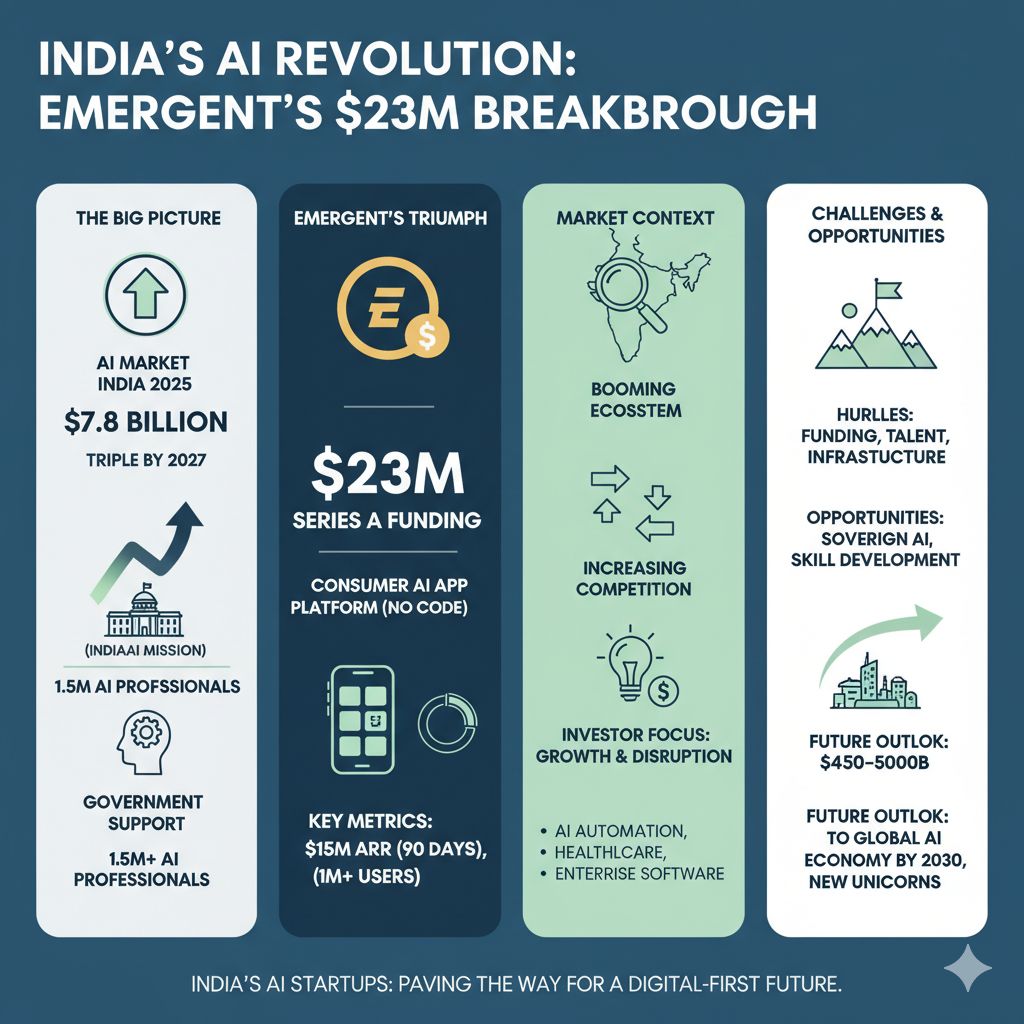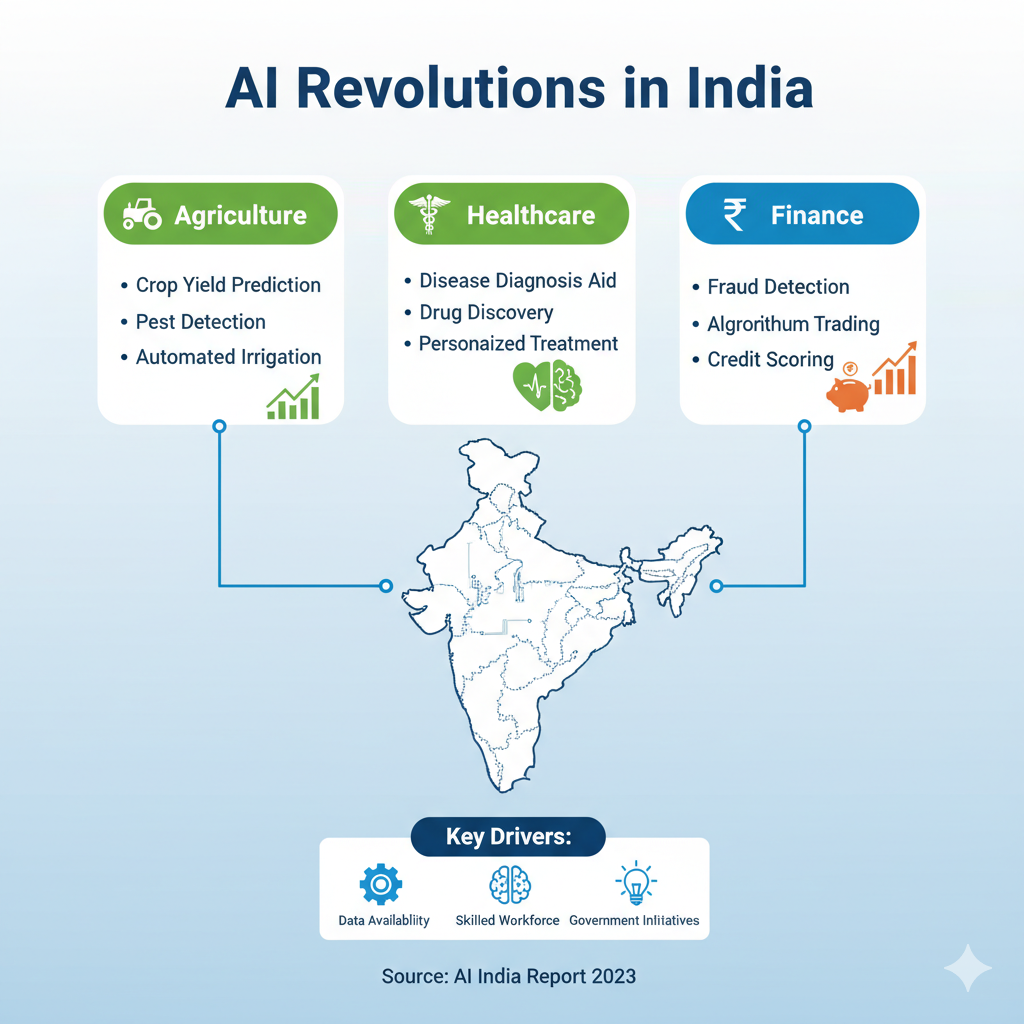Artificial Intelligence (AI) is no longer a futuristic concept; it’s the engine driving a massive transformation within the Indian startup ecosystem. Across the country, innovative startups are using AI to solve complex problems, disrupt traditional industries, and build India’s digital future. A shining example of this momentum is Emergent, a Bengaluru-based startup whose recent funding success has put a global spotlight on the nation’s burgeoning AI scene.
Emergent just closed a remarkable $23 million Series A funding round, a milestone that speaks volumes about investor confidence and the incredible potential of AI innovation in India. This article explores the AI revolution sweeping the nation, zooms in on Emergent’s breakthrough, and looks at what’s next for this dynamic sector.
The AI Landscape in India: A Look at Market Trends 2025
India’s AI market is experiencing explosive growth. In 2025, the sector is valued at nearly $7.8 billion, and according to AI market projections India 2025, it’s on track to triple in size by 2027. This incredible surge isn’t happening by chance. Several key factors are fueling the growth of AI startups in India.

- Government Backing: Proactive government programs, most notably the IndiaAI Mission, are creating a supportive framework for research and development. The IndiaAI Mission impact on startups has been significant, providing much-needed resources and strategic direction.
- A Deep Talent Pool: India boasts a massive and growing talent base of over 1.5 million AI professionals, providing the brainpower needed to build cutting-edge solutions.
- Venture Capital Excitement: There’s a strong inflow of venture capital in Indian AI startups, with investors eager to back promising companies that can scale.
This powerful combination is leading to widespread AI adoption in critical sectors like healthcare, finance, and retail, helping businesses become more efficient and innovative.
Emergent’s Series A Breakthrough: A Closer Look
Emergent has quickly become one of the top AI startups India 2025 has to offer. Its recent $23 million Series A round, led by the prominent firm Lightspeed Ventures India investments, is a major validation of its vision and execution.
So, what makes Emergent special? The company is pioneering a consumer AI app platform India has been waiting for. It empowers everyday users to build their own applications using autonomous AI agents, all without writing a single line of code.
Here are a few highlights of their incredible journey: - Rapid Revenue Growth: Emergent achieved an astonishing $15 million in annual recurring revenue AI startup metrics within just 90 days of its launch.
- Massive User Adoption: The platform has already attracted over 1 million active users.
- Democratizing Technology: Its core mission is to make app development accessible to everyone, from individuals to small businesses.
This funding will fuel Emergent’s next phase of growth, allowing them to enhance their product, expand their team, and scale their operations globally.
The Broader Context: Competition and Market Dynamics
Emergent’s success is a key part of a larger story about the Indian AI startup ecosystem growth. Many other Indian generative AI startups are also securing significant funding, especially in fields like automation, healthcare diagnostics, and enterprise software.
The AI investment landscape India 2025 is becoming increasingly competitive. Investors are carefully looking for startups that not only have disruptive technology but also a clear path to profitability and strong product-market fit. Emergent stands out with its consumer focus and impressive early revenue, setting a high bar for other emerging AI companies in Bengaluru and beyond.
Challenges and Opportunities for Indian AI Startups
While the outlook is bright, the path forward isn’t without obstacles. AI startup challenges in India are real and require strategic navigation.
Funding can be intensely competitive, especially for later-stage rounds. There’s also a talent crunch, as many top researchers are lured by global tech giants. Furthermore, infrastructure limitations and evolving data privacy laws can add layers of complexity.
However, these challenges are creating unique opportunities. The push for Sovereign AI initiatives India is gaining momentum, aiming to create homegrown large language models that are culturally relevant and reduce dependence on foreign technology. This focus on building the foundations of AI ecosystem India will be crucial for long-term, sustainable growth.
The Future Outlook: What’s Next for Indian AI?
The future for Indian AI startups looks exceptionally promising. With continued support from both the government and private investors, India is poised to contribute an estimated $450-500 billion to the global AI economy by 2030.
We can expect to see a new wave of innovation across agriculture, logistics, education, and finance. The thriving ecosystem will likely produce hundreds of new AI-powered unicorns, solidifying India’s position as a global leader in technology and a major player in the world’s digital economy.
Conclusion
Emergent’s $23 million funding round is more than just a win for one company; it’s a landmark moment for the entire AI revolution in Indian startups 2025. It showcases how homegrown innovation is attracting global attention and solving real-world problems. As these startups continue to overcome challenges and seize opportunities, they are not just building businesses—they are building the future.
Frequently Asked Questions (FAQ)
What is driving the rapid growth of AI startups in India?
Key drivers include government initiatives like the IndiaAI Mission, a large AI talent pool, increased venture capital, and broad sector adoption in finance, healthcare, and retail.
Why is Emergent’s Series A funding important?
It reflects strong investor confidence in Emergent’s consumer-focused AI platform and validates India’s growing and vital role in the global AI ecosystem.
Who are the major investors in Indian AI startups?
Leading investors include prominent firms like Lightspeed Ventures, Sequoia Capital, and Accel Partners, among many others.
What challenges do AI startups face in India?
They face intense funding competition, a shortage of top-tier talent, infrastructure limitations, and complex data privacy regulations.
Which sectors benefit most from AI in India?
Healthcare, agriculture, finance, retail, logistics, and education are the primary beneficiaries of AI-driven transformation, seeing significant improvements in efficiency and innovation.



